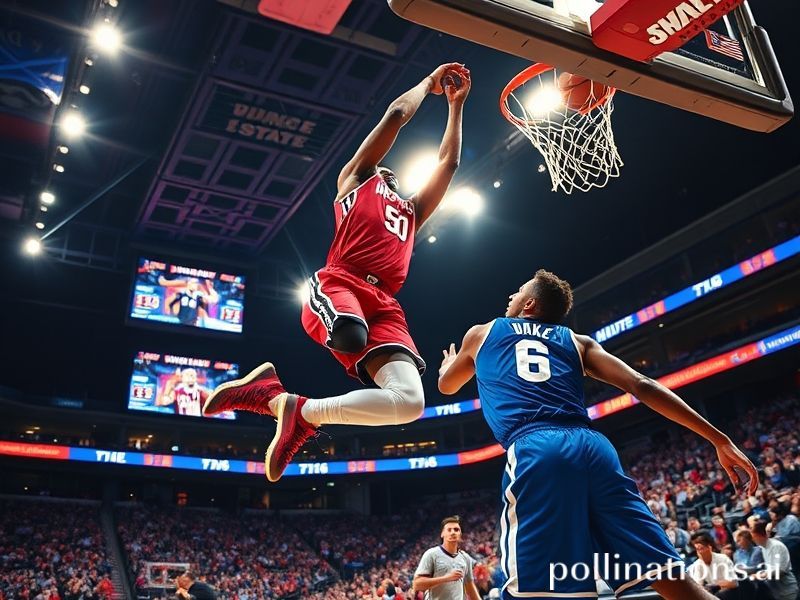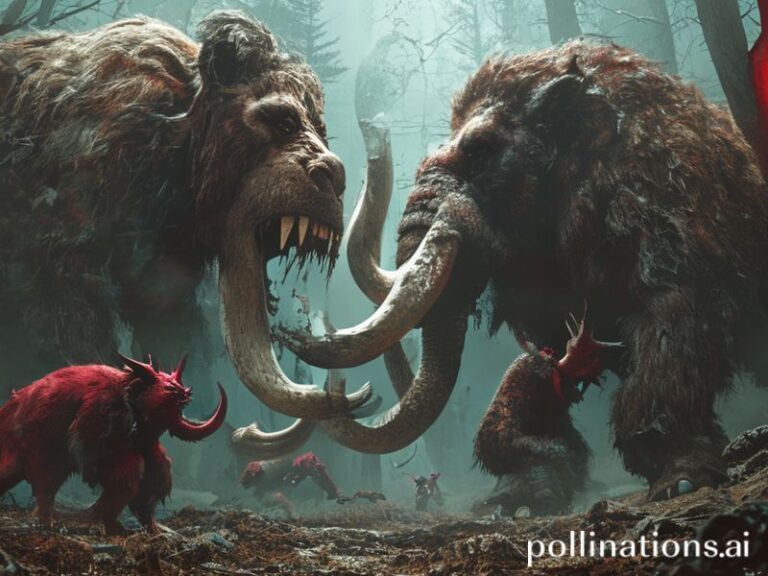NC State vs Duke: The World’s Most Expensive Neighborhood Squabble Masquerading as Destiny
RALEIGH, N.C. — While the rest of the planet frets over recessionary tea leaves and the faint possibility that the Doomsday Clock might finally stop bluffing, a modest wedge of the United States has decided the truly urgent question is whether 19-year-olds in matching pajamas can throw an orange sphere through a metal ring more efficiently than their equally caffeinated neighbors.
Yes, NC State versus Duke—an intramural tiff that, on the cosmic spreadsheet, registers somewhere between “Belgium renames a roundabout” and “another crypto-bro discovers bankruptcy.” Yet every March, this particular zip-code squabble is inflated into a morality play, exported worldwide by the gleaming content-industrial complex that has learned, like any competent cartel, to cut its product with just enough nostalgia to keep the customers twitching.
From Dakar to Delhi, insomniacs with League Pass subscriptions now watch Raleigh’s finest attempt to avenge 40 years of institutional condescension from Durham’s Gothic darling. Analysts in Singapore track the spread the way currency traders eye the yen, while a bar in Munich opens at 03:00 to serve Weizenbier and existential dread to Germans who have convinced themselves this game explains America better than any civics textbook. Spoiler: it does.
The rosters themselves are miniature Ellis Islands. Duke starts a Canadian surgeon’s son who shoots threes like he’s invoicing them, plus a Senegalese freshman whose wingspan could qualify for EU citizenship. NC State counters with a Croatian guard who lists “war stories” under hobbies and a forward from rural North Carolina whose primary dialect is barbecue. Globalization’s triumph: everyone can read the pick-and-roll, few can correctly pronounce “Krzyzewski.”
Geopolitically, the contest is packaged as a proxy battle between the Research Triangle’s twin vanities: State’s land-grant authenticity versus Duke’s private-sector smugness. Think of it as Brexit, but with better dental work and no actual exit—just periodic 40-minute referendums on which shade of blue gets to feel superior until the next news cycle. The winner earns the right to chant “We’re the real Carolina” at strangers on the internet, a claim roughly as verifiable as any given ceasefire in the Caucasus.
Overseas audiences are told this matters because the NBA draft looms, and every blocked shot is a résumé bullet for future millionaires. That economic subplot is catnip for nations that have outsourced their own basketball dreams to American teenagers; France alone has three lottery picks on retainer, quietly praying none of them blow out an ACL in a February game against Boston College. Meanwhile, the NCAA—an organization that makes FIFA look like Amnesty International—collects the broadcast revenue, pays the labor in scholarship coupons, and still wonders why Gen Z keeps doom-scrolling through the second half.
And yet the spectacle persists, because humans, bless our easily distracted hearts, crave simple narratives. Climate tipping points are messy; a buzzer-beater is clean. Supply-chain collapses lack a play-by-play; a 9-0 run fits neatly between commercials for pickup trucks and erectile-dysfunction pills. Somewhere in Nairobi, a boda-boda driver checking scores on a cracked Android feels a flicker of solidarity with a UNC fan in Chapel Hill: both are collateral damage in someone else’s tribal ritual.
When the final horn sounds, the winning student section will storm the court as though they personally sank the jump shots, the losers will claim moral victory and a better endowment, and the rest of us will glance back at our phones to discover the world has, against all odds, continued its slow-motion implosion. But for two hours, NC State versus Duke offered the sweetest opium of all: the illusion that outcomes are still decided by effort, talent, and the occasional friendly whistle, rather than inherited privilege or algorithmic cruelty.
In that sense, the game is the perfect American export: a locally grown delusion, shrink-wrapped for planetary consumption, best enjoyed before the expiry date of your attention span. The French have champagne, the Japanese have cherry blossoms, and we have unpaid labor playing sudden-death kabuki for a trophy that looks suspiciously like a corporate paperweight. Drink up, planet; history will only remember the box score if we’re lucky.







